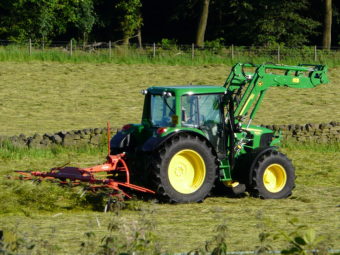A court case that pits farmers’ rights against neighbors’ rights has wafted its way up to the Alaska Supreme Court.

The court is hearing arguments Wednesday in a case between Robert Riddle, who hauls septic tank waste for a living that he stores and uses on Fairbanks-area farmland he owns, and Eric Lanser, a neighboring landowner and homebuilder.
It’s the first case to test Alaska’s Right to Farm Act.
While it sounds like a classic nuisance case, it’s atypical because Robert Riddle’s defense invokes a 1986 law known as Alaska’s Right to Farm Act. The law gives existing farms that meet certain conditions immunity to private nuisance complaints, like the smell of sewage sludge drifting across property lines.
A key question the Supreme Court must decide is whether Riddle is entitled to the act’s protections – does his land and the sewage lagoons on it meet the law’s definition of a farm?
The lower court judge sided with the developer, Eric Lanser, and ordered Riddle to cut the odors. Some of the rhetoric around deciding if Riddle’s land was a farm had to do with its finances and the idea of “commercial production.” Riddle’s farm doesn’t do much business. He makes his living hauling septage.
The attorneys in the case declined to comment ahead of their day in court, but farming interests in the state are watching this case closely.
Bryce Wrigley is a working farmer — he has a flour mill in Delta for cereal, couscous and the like — and he’s the president of the Alaska Farm Bureau. Wrigley said the farm bureau, an advocacy organization, hasn’t taken an official position on the case itself, but it is concerned about broader potential impacts.
“Setting a precedent and a litmus test by saying, this is not a farm because they haven’t sold anything or they haven’t sold enough is a dangerous thing, we believe. And we believe it undermines the integrity of that right to farm law,” Wrigley said.
He said peony farms, for example, could take three to five years to produce flowers for sale.
“So that was troubling. Especially where I had been out there. … There’s no question in my mind that he had a farm. I saw his crops, I saw equipment, I saw that he had harvested, he had animals out there. I mean, there’s nobody in their right mind that could say he didn’t have a farm. … Man, it just blew my mind that anybody could consider that not a farm,” Wrigley said.
According to the Fairbanks Daily News-Miner, Riddle has tried growing peonies, as well as sod, hay and potatoes. He’s also sharecropping.
Wrigley said whether farming is a side business or not should be immaterial to the case. He said lots of farmers work separate day jobs.
Gavel Alaska is providing live streaming and television coverage of the Supreme Court’s hearing on the case at Colony High School in Palmer. Coverage begins at 9 a.m. on 360 North television, or stream it here.
